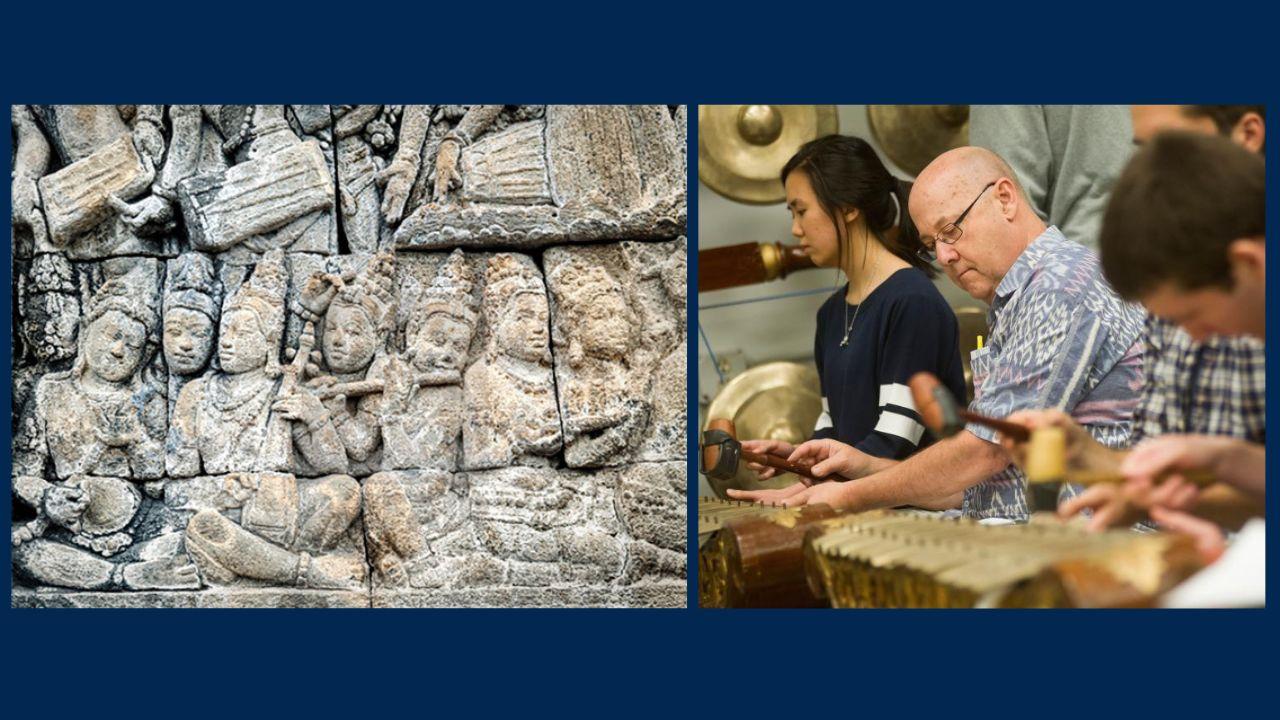
Deep Dive Into Indonesian Music
Luce Foundation-Funded Project Holds 2nd International Conference
As part of an ongoing study stretching from Davis to Germany and across the many islands of Indonesia, the UC Davis Department of Music is holding a second conference on Indonesian music. “Rethinking The History Of Indonesian Music” on Nov. 5 brings together scholars from around the globe and is organized by Professor Henry Spiller and Professor Emerita Anna Maria Busse Berger.

The conference is part of a broader project titled “Toward a Music History of the Indonesian Archipelago,” launched in 2019 with a major award from the Henry Luce Foundation. The research taps into largely ignored documentation of Indonesian music by German and Dutch missionaries in the late 19th and early 20th centuries. Busse Berger discovered these documents several years ago and brought them to the attention of Spiller, who studies the music of West Java, Indonesia.
Visit the conference website for more details and to register.
The project has opened up new sources for research on Indonesian music and has also helped develop a network of scholars with similar interests.
“Our project contributes to broader efforts to decolonize making music histories, which is steeped in 19th-century rubrics of scholarship and 20th-century colonialist biases,” Spiller said. “We put different kinds of historical data from Indonesia into dialogue to recognize a multitude of possible historical narratives, and ultimately to interrogate how histories motivate and/or justify present-day musical ideologies and activities.”
The Luce Foundation award funded research, conferences and a postdoctoral position. A book of the papers presented at the conferences is forthcoming.
Work gaining international attention
Indonesia and Religion

Indonesia, made up of 17,500 islands, has a wide variety of music with the best-known being the gamelan, an ensemble of tuned percussion instruments. Islam came to the islands in the 13th century and was already well-established when Catholic and Protestant missionaries first arrived in the 1600s. Indonesia has the world's largest Muslim population — 85% of its 300 million people are Muslim. There are pockets of Christians making up 10% of the nation’s population.
With outreach to scholars around the globe, this year’s conference (which will also be livestreamed) brings together musicologists, as well as historians, anthropologists and film scholars from Malaysia, the Netherlands, Germany and throughout the U.S.
“By inviting prominent scholars to UC Davis to participate in the conferences, and by making livestreams of the conferences available all over the world, we help internationalize UC Davis’ reputation as an important place for serious music scholarship,” Spiller added.
The research will receive even wider exposure when postdoctoral scholar Dustin Wiebe chairs a panel at the joint meeting of the American Musicological Society, the Society for Ethnomusicology and the Society for Music Theory in November. The three societies meet jointly only every 10 years.
“It has been a pleasure to get together and develop this project,” Busse Berger said. “I think it is the first of its kind in music and is getting a lot of attention.”
Unique and extensive documentation
Busse Berger came across the missionary archives while researching her award-winning 2020 book The Search for Medieval Music in Africa and Germany, 1891-1961: Scholars, Singers, Missionaries.
“This material has been difficult to find, scattered and ignored,” Spiller said when the Luce Foundation award was announced. “It has been ignored because it was collected by missionaries and considered biased, but that’s throwing out the baby with the bathwater. We’re not trying to redeem the missionaries, but to make the priceless information they collected available to all interested parties.”
Since then, Spiller, Busse Berger and Wiebe have spent many hours poring through the documents.
“The amount of writing and letters they produced is mind-boggling — thousands of pages,” Spiller said. “You have to sift through a lot of these pages to find anything. The handwriting is bad, the language is not mine and the paper is thin.”
But he found many gems, including one statement from a missionary that’s serving as the title of his conference presentation: “I Am in No Way Surprised That The Javanese Can Listen to it All Night Long.”
“This is someone really enchanted and entranced by the music,” Spiller said.
— Jeffrey Day, content strategist in the UC Davis College of Letters and Science
